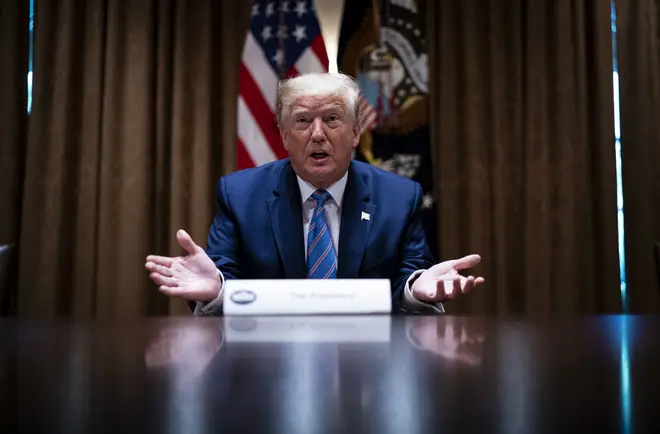
Nick Abbot 10pm - 1am
16 June 2020, 08:31

President Donald Trump is set to sign an executive order enforcing police reforms in the US following huge protests over police brutality and racism.
It is aimed at improving how the police treat black Americans and is thought to include setting up a database to track officers who have complaints about excessive use of force in their records.
Officials said the president wants to keep officers facing such accusations from being able to hop from one police department to another.
They added the executive order would also establish a national credentialing system that would give police departments a financial incentive to adopt best practices on such things as use of deadly force.
Senate majority leader Mitch McConnell opened the chamber on Monday declaring that Senate Republicans are developing "a serious proposal to reform law enforcement."
Many Democrats want to Defund and Abolish Police Departments. HOW CRAZY!
— Donald J. Trump (@realDonaldTrump) June 15, 2020
While the emerging GOP package is not as extensive as the sweeping Democratic proposal, which is headed for a House vote next week, it is perhaps the most far-reaching proposed changes to policing procedures from the party long aligned with a "law and order" approach.
Senator Tim Scott of South Carolina, the sole African American Republican in the Senate, has been crafting the package set to roll out on Wednesday, and said he spoke with President Trump about it over the weekend.
Mr Scott warned that any delay in voting would be a "bad idea" and has said the chokehold, in particular, "is a policy whose time has come and gone".
The weekend shooting death of Rayshard Brooks by a white officer in Atlanta led to a renewed public outcry, more street protests and the police chief's swift resignation.
Democrats have said the GOP package does not go far enough to match the outpouring of support for reforms.

George Floyd death: Where are the main protests flaring up?
Senate Democratic leader Chuck Schumer warned Republicans not to settle for minor changes.
"Now is the time to seek bold and broad-scale change, not change around the margins," Mr Schumer said.
With the political debate fluid, it is unclear whether the parties will be able to find common ground.
The proposals share many similar provisions but take different approaches to address some of the issues.
Neither bill goes as far as some activists want in their push to "defund the police" by fully revamping departments.

Protesters torch Minneapolis police station after black man's death
Central to the Republican package would be the creation of a national database of police use-of-force incidents. The Democrats have a similar provision.
The GOP bill would encourage police body cameras and include a long-stalled effort to make lynching a federal hate crime.
Additionally, the Republican package is expected to restrict the use of chokeholds by withholding certain federal funds to jurisdictions that continue to allow the practice, according to a Senate Republican unauthorised to discuss the pending bill and granted anonymity.
While chokeholds have become a symbol of police brutality - and a ban is included in the Democrats' bill - the manoeuvre is already banned in many departments.
Yet, the Republican bill does not go as far as the Democratic proposal, particularly on the the issue of "qualified immunity," which aims to enable those injured by law enforcement personnel to sue for damages.
Still, Democrats signalled a willingness to look at the Republican approach for areas of common ground.
The Senate Judiciary Committee is scheduled to consider policing issues at a hearing on Tuesday.